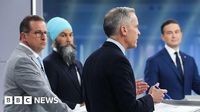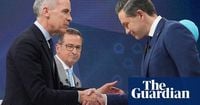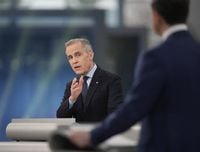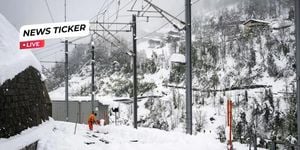In a high-stakes leaders' debate held in Montreal on April 16, 2025, the leaders of Canada’s four major political parties confronted pressing issues surrounding U.S. President Donald Trump, energy policies, and the housing crisis. This French-language debate marked a pivotal moment in Canada’s snap election campaign, especially as the country gears up for voting day on April 28.
Prime Minister Mark Carney, who recently took over leadership from the unpopular Justin Trudeau, faced significant scrutiny during the debate. With his French language skills being the weakest among the candidates, Carney struggled at times to articulate his points effectively. His performance was critical as the Liberals are currently leading in Quebec, a province with 78 of the 343 seats in the House of Commons.
The debate was moderated by Patrice Roy of Radio-Canada, who opened the forum by stating that the election had been “hijacked by Trump.” He urged each leader to present two campaign promises unrelated to the U.S. However, the conversation quickly turned to the trade war initiated by Trump, which has imposed a blanket 25% tariff on Canadian goods, causing economic strain.
Carney emphasized that the election is fundamentally about who can best navigate the challenges posed by Trump. “The question is who’s going to succeed in facing Donald Trump,” he said in French, attempting to distance himself from Trudeau’s legacy. He highlighted his experience as a former central banker and his commitment to economic growth, stating, “In fact in this circumstance that we are in, given the scale of the crisis, I would say relentless focus on growing the economy.”
Conservative leader Pierre Poilievre, aiming to capitalize on the Liberal government’s vulnerabilities, accused Carney of being just another iteration of Trudeau. “You’re just like Justin Trudeau,” Poilievre asserted, calling for a change after a decade of Liberal rule. His remarks were aimed at framing the election as a referendum on the previous administration’s policies, particularly in light of rising food and housing prices.
Poilievre strongly supported increasing oil production, responding with an emphatic “yes” when asked if he would boost the industry. He argued that Canada needs to reduce bureaucratic barriers to home building, saying, “We don’t need more bureaucracy, we need more front doors.” His stance on energy resonated with some voters, particularly in a province where economic stability is a priority.
Jagmeet Singh, leader of the New Democratic Party (NDP), painted both Carney and Poilievre as unsuitable choices for Canadians concerned about job security amid U.S. tariffs. He criticized their tax policies, claiming they would favor the wealthy at the expense of ordinary Canadians. Singh also expressed frustration with the debate moderator, accusing him of unfairly limiting discussions on healthcare, another critical issue for many voters.
Yves-François Blanchet, leader of the Bloc Québécois, echoed calls for change while emphasizing Quebec’s unique economic needs. He criticized Carney for promising significant financial relief to the Ontario auto industry while Quebec has faced its own economic challenges, particularly regarding tariffs on lumber. Blanchet stated, “So far all we have seen is efforts being deployed to protect the Ontario economy, which is the way Canada defines itself.”
The debate also touched on immigration, with leaders agreeing on the necessity of integrating newcomers and asylum seekers. The recent uptick in asylum seekers crossing the Quebec-U.S. border has been attributed to the Trump administration’s stringent immigration policies. This situation has put additional pressure on Canadian infrastructure, which has struggled to keep pace with rapid population growth.
Adding to the complexity of the evening was the absence of the Green Party, which was disqualified from the debate for not meeting certain criteria. Co-leader Jonathan Pedneault condemned the decision as “baseless” and “undemocratic,” highlighting the ongoing challenges smaller parties face in the Canadian political landscape.
The debate was also rescheduled to avoid a conflict with a Montreal Canadiens hockey game, demonstrating the cultural significance of sports in Canadian society. As the NHL team faced off against the Carolina Hurricanes, the timing change underscored the intertwined nature of politics and public interest in Canada.
As the candidates shook hands at the conclusion of the debate, the focus shifted to the upcoming English-language debate scheduled for April 17, 2025. This next forum promises to be more widely viewed, and with only days left until the election, the stakes are higher than ever.
In the lead-up to the election, polls indicate that the Liberals have gained ground, now leading by eight percentage points over the Conservatives—an impressive turnaround from earlier in the year when they trailed significantly. With 12 days remaining in the campaign, voters are eager to see how the candidates will address the pressing issues that affect their lives.
As the candidates prepare for their next encounter, the question remains: who will emerge as the most capable leader to face the challenges posed by Trump and the pressing domestic issues facing Canadians today?






